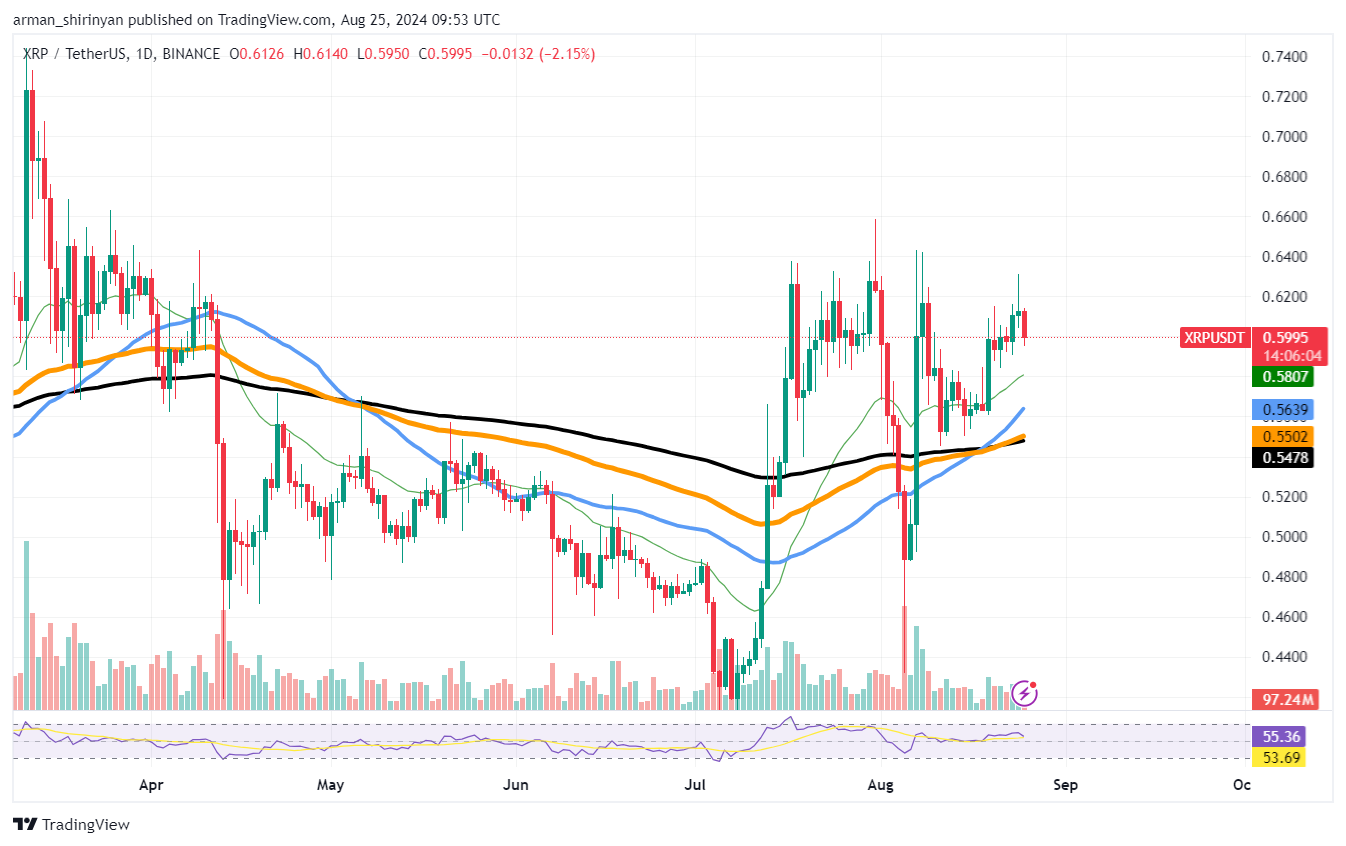Sun, 24/03/2024 – 22:00
Disclaimer: The opinions expressed by our writers are their own and do not represent the views of U.Today. The financial and market information provided on U.Today is intended for informational purposes only. U.Today is not liable for any financial losses incurred while trading cryptocurrencies. Conduct your own research by contacting financial experts before making any investment decisions. We believe that all content is accurate as of the date of publication, but certain offers mentioned may no longer be available.
Advertisement
Recently, SEC Chair Gary Gensler issued fresh warnings about cryptocurrencies amid Bitcoin’s surge to a new all-time high. He emphasized concerns about abuses and fraud within the crypto space, cautioning investors about the speculative and volatile nature of Bitcoin.
Although Gensler refrained from commenting specifically on pending applications, he did highlight broader challenges in the crypto industry, including risks associated with intermediaries pooling digital assets without providing adequate disclosures, which could jeopardize investors.
The latest data shows that the rise of fraud in the crypto industry is correlated with the uprising of Bitcoin.
2023, biggest year for crypto fraud
Based on Chainalysis data, scams remained a significant driver of cryptocurrency-based crime in 2023, generating at least $4.6 billion in revenue.
The FBI’s Internet Crime Report for 2023 reveals that losses from crypto investment scams in the U.S. surged to $3.94 billion, up 53% from the previous year’s $2.57 billion. Investment scams became the most common internet crime in 2023, comprising over a third of the total reported losses of $12.5 billion.
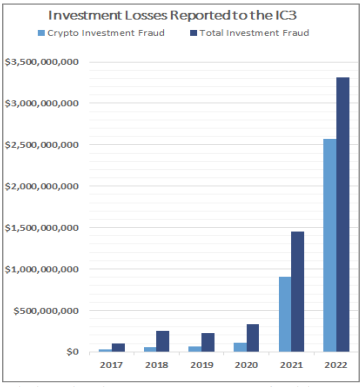
Ransomware attacks saw an 18% increase in 2023, with reported financial losses soaring by 74%, reaching a total of $59 billion. These figures underscore the significant threat posed by cybercriminals, particularly to critical infrastructure sectors.
Online fraud losses surpassed $12.5 billion in 2023, marking a 22% increase from the previous year. Business email compromise scams, which target both companies and individuals, contributed $2.9 billion to the total losses in 2023.
Why fraud rising
When the market sentiment is strong, more people will be looking for high-yield opportunities.
According to research by Chainalytics, scams tend to generate less revenue during crypto market declines, as shown in the graph correlating scam revenue with Bitcoin prices in 2022.
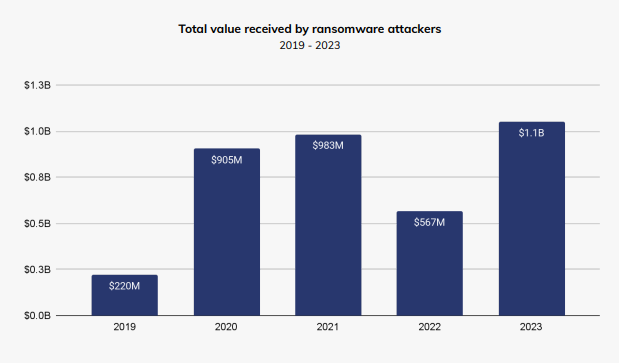
Most popular schemes
According to Chainalysis, scams remained a significant driver of cryptocurrency-based crime in 2023, generating at least $4.6 billion in revenue.
The BBB’s annual report on scams in 2023, drawing from 67,000 scam reports, highlighted creative methods scammers use to defraud investors. According to the BBB, approximately 80% of Americans targeted by crypto and investment scams in 2022 suffered financial losses. Furthermore, the percentage of individuals reporting losses to romance scams surged by over 300% compared to 2022.
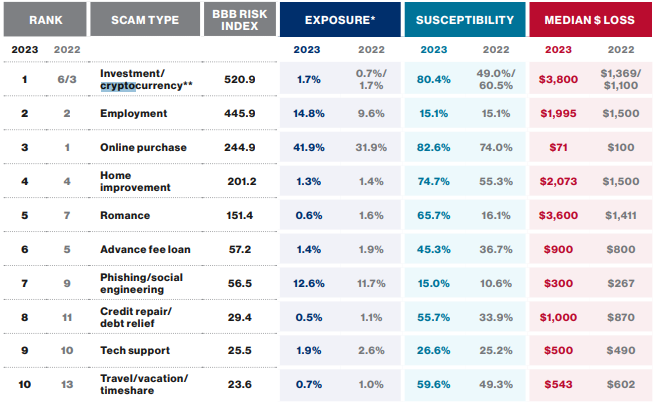
Pump and dump schemes are rampant, exploiting newly created tokens to artificially inflate prices, allowing scammers to cash out at the peak. Chainalysis highlights that out of over 370,000 tokens launched on Ethereum in 2023, only a fraction gained significant liquidity.
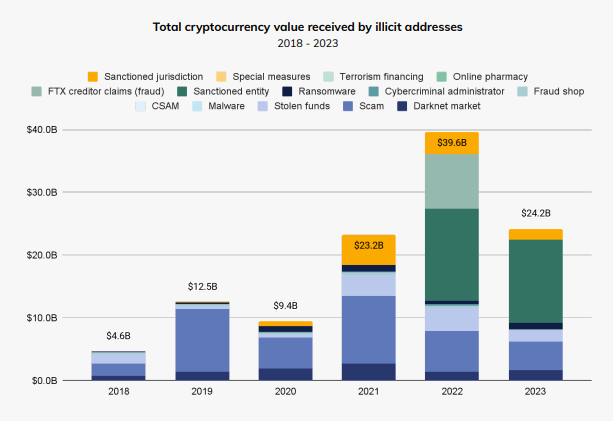
Romance scams have surged, increasing 85-fold since 2020. Starting on dating apps, scammers build trust over time before coaxing victims into joint crypto investments, resulting in substantial financial losses.
The Better Business Bureau reported that cryptocurrency and investment scams have become the riskiest type of cons in the U.S., with fraudsters frequently defrauding victims out of thousands of dollars.
According to the BBB’s annual report on the biggest scams of 2023, based on 67,000 reports of scams, scammers have devised creative methods to swindle investors. Approximately 80% of Americans targeted in these scams lost money, with the median amount lost being $3,800.
Hackers
Hackers often use social media, video game platforms, or text messages to contact individuals and boast about their financial success due to a crypto investment. Subsequently, they persuade the victims to invest as well.
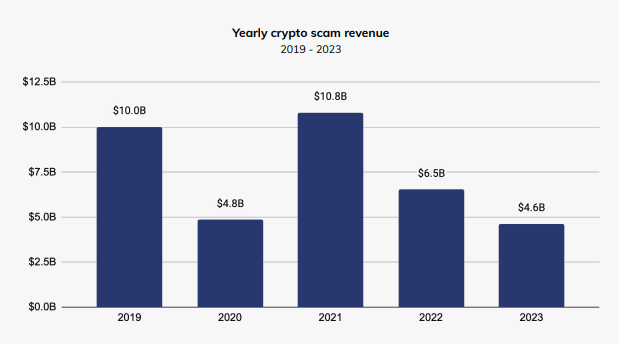
The surge in hacking coincided with increased investment by U.S. investors during the pandemic, leading to losses due to cyberattacks on platforms with poor cybersecurity. For instance, North Korean cybercriminals alone stole $1.7 billion in cryptocurrency, setting a new record and highlighting the significant role of cryptocurrency theft in the nation’s economy.
As scammers employ increasingly sophisticated tactics, such as romance scams, it becomes more challenging to identify associated addresses. Romance scammers often communicate directly with victims through private channels like text, making it difficult for blockchain analysts to identify these addresses as scam-related.
This likely leads to undercounting of scam activity, particularly in recent years as romance scams have become more prevalent.
How to protect oneself from scams
The risk is inherent in the world of crypto trading due to its decentralized nature and irreversible transactions. These factors expose traders to vulnerabilities, making it difficult to recover funds in the event of a scam.
Staying vigilant, identifying scams early and exercising caution in your crypto dealings are crucial strategies for self-defense. By remaining aware of potential risks and taking proactive measures to mitigate them, traders can better protect themselves from falling victim to scams and minimize potential losses.




